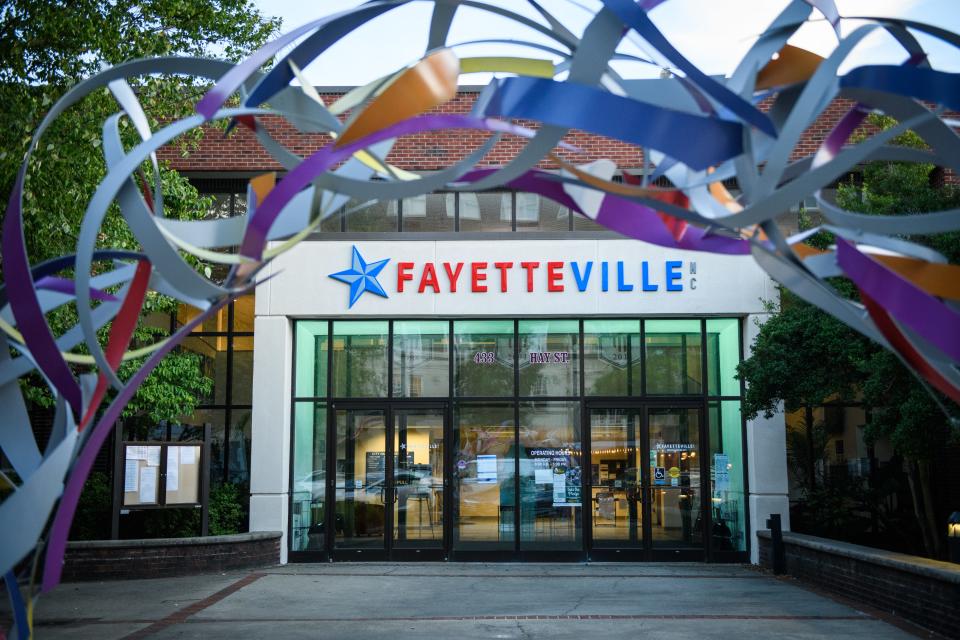Fayetteville denies request to provide document. Is the city violating public records law?
- Oops!Something went wrong.Please try again later.
Editor's note: This story has been updated to reflect that Chief Braden handed the documents to Deputy City Clerk Jennifer Ayre.
In denying The Fayetteville Observer and members of the public access Tuesday to documents passed out by Police Chief Kemberle Braden at a September City Council meeting, the city of Fayetteville may have violated public record law.
According to the University of North Carolina at Chapel Hill's School of Government, any records "made or received in connection with the transaction of public business," such as City Council meetings, fall under public record.
Braden handed out the documents in question to council members at a Sept. 18 special meeting on a potential juvenile curfew, giving a stack of papers to Deputy City Clerk Jennifer Ayre before he began his presentation on Police Department data tied to the curfew.
“As we go over the actual PowerPoint proposal, I would like to pass these — this folder around for the council to review,” Braden said. “It references some things that are pertinent to the conversation tonight.”
After Braden finished his presentation, Mayor Mitch Colvin asked if the documents he had given to the council could be shared with the audience.

“I didn’t wanna share the actual visuals — the pictures are sensitive in nature — but it’s an array of probably about — I don’t, I didn’t even count the number of pictures in there,” Braden said.
Braden also said:
The documents contained 20 pictures of "youthful offenders" in Fayetteville whose identities and faces had been "blacked out".
The photos were allegedly taken from social media posts and featured juveniles holding guns "nicer than the Police Department carries at times" that could "potentially penetrate bulletproof vests".
The images were not part of current investigations.
During the meeting, Colvin asked or said:
Why the photos couldn't be shown.
That information passed out at a public meeting is public record.
That the photos would already be considered public because they were taken from social media.
Interim City Attorney Lachelle Pulliam said she was concerned about the “sensitivity” of the photos because juveniles were involved.
“I’d like to err on the side of caution and not show the images,” she said. “Even though their faces are blacked out, there may be other identifying attributes.”
Council member Mario Benavente told the audience that the documents contained 20 pictures of “young Black men,” some holding guns.
“I see a lot of white young men on Facebook posing with guns, as well,” he said. “It’s just interesting to me when we find that to be offensive.”
Colvin said Wednesday that council members had to hand back the documents to Megill after reviewing them.
Request rejected
The Observer submitted a public records request for the documents to the city of Fayetteville on Sept. 19. The request was reassigned to the Fayetteville Police Department, which rejected the request Oct. 3, stating that the “record(s) you have requested do not fall under the public records category.”
In a separate message, the department claimed that the records would not be public because they involved juveniles and because they were “records of criminal intelligence information.”
Mike Tadych, a Raleigh-based attorney who provides legal counsel to the North Carolina Press Association, said the records could not be denied by the Fayetteville Police Department because they became the property of the city once they were given to City Council members. The Observer is a member of the North Carolina Press Association.
“The City Council are the custodians of those records, not the FPD or its Chief,” Tadych said via email Oct. 3.
Tadych pointed to the North Carolina Supreme Court’s 1992 ruling in News and Observer Publishing Company v. Poole, where the court ruled that law enforcement records become public record when given to public agencies.
Through a city spokesperson, Pulliam provided the following response Tuesday to a renewed request submitted by the Observer on Oct. 3: "The requested records shall be withheld from public inspection pursuant to N.C.G.S. § 7B-3001(b). No, the requested law enforcement records concerning juveniles do not become subject to public inspection just because redacted versions were shown to some council members during an open meeting."
News director Beth Hutson explained why The Fayetteville Observer felt compelled to seek the documents even though their contents were discussed in open session.
"The Fayetteville Observer believes it is the public's right to know what business is conducted on its behalf," Hutson said. "Part of our job — the most important part of our mission — is to protect the public's right to know."
Government watchdog reporter Lexi Solomon can be reached at ABSolomon@gannett.com or 910-481-8526.
This article originally appeared on The Fayetteville Observer: City of Fayetteville potentially breaks law in rejecting records request

